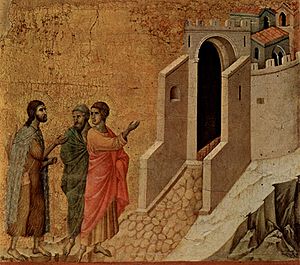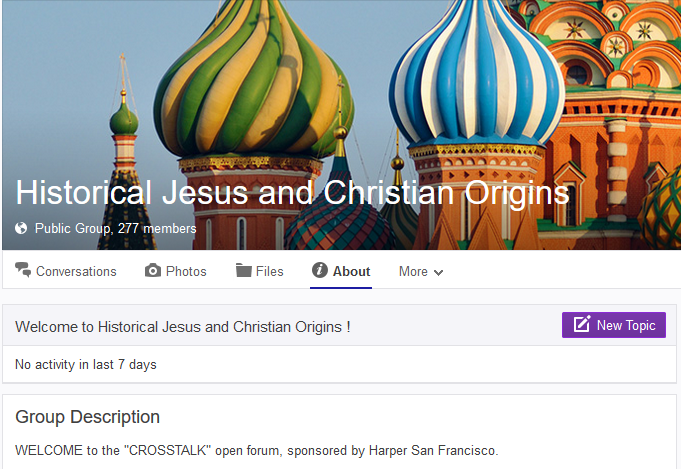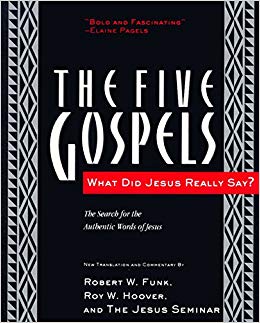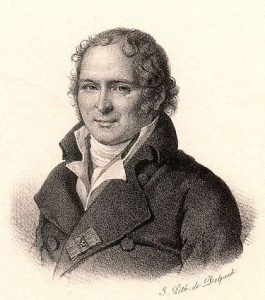I have decided to present this early conversation to allow readers to see the evidence and judge for themselves various claims that are made about the character of those early exchanges.
5011 The Jesus Puzzle
Earl D
Feb 9, 1999
On the weekend, Bill told me that he had brought the Crosstalk list’s
attention to my web site (Earl Doherty, The Jesus Puzzle) and asked for
opinions. He sent me a selection of postings he had gotten in response. On
Monday morning, I resubscribed myself after an absence of a few months, and
read several more responses to Bill’s queries about my views and those of
other “mythicists”.
I was floored. Ridicule, outright insult, rude dismissal of any counter
argument, all delivered with an air of smug superiority that would do any
fundamentalist proud. Is this the discussion of reasonable and educated men
(I haven’t noticed any women yet), moving in the corridors of open-minded
investigation and an honest search for truth and understanding? Many of the
Crosstalkers identify themselves as members of university faculties, where
one assumes the standard is one of reasoned debate and basically courteous
discussion, even where contentious ideas are involved. Instead, the
reaction to Bill’s queries has been mostly that of snarling dogs incensed at
having their fireside chats disturbed by unorthodox inquiry. The ad hominem
attacks in several of those postings would be flattered by the word
“sophomoric”.
I was floored. Ridicule, outright insult, rude dismissal of any counter
argument, all delivered with an air of smug superiority that would do any
fundamentalist proud. Is this the discussion of reasonable and educated men
(I haven’t noticed any women yet), moving in the corridors of open-minded
investigation and an honest search for truth and understanding? Many of the
Crosstalkers identify themselves as members of university faculties, where
one assumes the standard is one of reasoned debate and basically courteous
discussion, even where contentious ideas are involved. Instead, the
reaction to Bill’s queries has been mostly that of snarling dogs incensed at
having their fireside chats disturbed by unorthodox inquiry. The ad hominem
attacks in several of those postings would be flattered by the word
“sophomoric”.
The theory that no Jesus of Nazareth existed at the beginning of the
Christian movement has been around for two centuries, championed by many
researchers in many countries over the years, some of them respected
scholars, long before Wells or myself. Outright “loony” ideas don’t usually
have that kind of shelf life. The myth theory is there, and refuses to go
away, and the fact that it exists in a charged field like religion does not
justify it being denied the respect it might deserve. After all, we would
surely condemn any physicist, any anthropologist, any linguist, any
mathematician, any scholar of any sort who professes to work in a field that
makes even a partial bow to principles of logic and scientific research who
insisted on ignoring, vilifing, condemning without examination a legitimate,
persistent theory in his or her own discipline. There are tremendous
problems in New Testament scholarship, problems that have been grappled with
for generations and show no sign of getting any closer to solution.
Agreement is lacking on countless topics, and yesterday’s theories are being
continually overturned. Scholarly commentaries are shot through with words
like “riddle”, “puzzling”, “insoluble.” Some documents are said to “lead to
despair.”
Sorry, I don’t mean to turn this into a lecture, but if any of you would
take an honest and open-minded look at some of my site you might find
material that would at least give some food for thought. Two members of the
Jesus Seminar, Darrell Doughty and Robert Price, were impressed enough with
it that they invited me to write an original article for their Journal of
Higher Criticism (out of Drew University). Both of them have brought up my
name and observations at Jesus Seminar meetings on a couple of occasions.
That Journal article appeared in the Fall 1997 issue, and is now reprinted
on my site. It would be a good intro to the essentials of the Jesus-as-myth
theory, particularly my own arguments for it, which differ substantially
from those of Wells in important respects. I’ll quote the direct URL for it
at the end of this.
I’ll also quote a couple of other articles on the site which I regard as
especially cogent. While I hardly claim to be an expert in every aspect of
biblical research (is there anyone here who would be that presumptuous?), I
would be willing to let a few of the efforts now on my site (my analysis of
Hebrews, for example, or my consideration of contemporary Platonism and
hellenistic mythological thinking (in Article 8) as it may shed light on
what Paul actually believed) stand beside anything produced in these
areas–always allowing for the fact that I’ve aimed partly for the
understanding of the general, uninitiated reader. Those of you who take the
trouble to look at them are certainly free to challenge me, hopefully with a
modicum of professionalism and common human decency.
One of the things that has struck me in reading responses to Bill is the
general lack of understanding even of the basic principles of the
non-existence of Jesus theory. This, of course, is due to the disdainful
and knee-jerk dismissal of the very idea which is commonly accorded it. It
seems to me that if you seriously want to cope with this stubborn theory
which refuses to go away and which is gaining wider currency even in the
general population (if you hadn’t noticed), you owe it to yourselves and
your discipline (I won’t say your confessional beliefs) to investigate the
matter a little more thorougly, so as to offer a more reasoned and effective
response to it.
What also surprised me was the rejection, or ignoring, by many of
well-established views within standard liberal scholarship, such as the
widespread rejection, or at least questioning, of the authenticity of 1
Thessalonians 2:15-16. Labelling this an interpolation is not exactly some
arbitrary crackpot idea of my own. Pearson is ably seconded by such as
Mack, Koester, Meeks and Brandon. One cannot simply ignore a body of voices
like that when seeking to heap scorn on myself. Another case is failing
even to acknowledge the view held by many (such as Norman Perrin, whom I
highly respect and regret the early death of) that Paul’s so-called “words
of the Lord” in 1 Corinthians are not a drawing on any body of Jesus’
earthly teaching in circulation, but are personal communications he believes
he has received from Christ in heaven, something postulated as a common
feature of the early prophetic movement. The same goes for the common
interpretation of 1 Cor. 2:8’s “rulers of this age” as referring to the
demon spirits (which is one of the cornerstones of my argument). Not even
to take such trends within one’s own discipline into account in one’s
arguments (even if you don’t agree with them) is hardly the mark of honest
and up-to-date investigation and debate.
Some of what was written by a couple of people against Bill was
unconscionable in a milieu that professes to be dedicated to reasoned and
scientific discussion of historical questions, and I am reminded of a
comparison I made to the fundamentalist J P Holding who attacked my views.
I called his attention to a short piece of music by the American composer
Charles Ives, called “The Unanswered Question.” Against a quiet orchestral
backdrop, a serene trumpet asks a musical question which a chorus of flutes
at first calmly and confidently answers, but when the questioner continues
to restate his query several times (evidently because the answer is
inadequate) the flute contingent gradually degenerates into nattering,
scoffing, sneering hyenas choking on their own scorn. (I recommend the
Leonard Bernstein performance.) I guess Ives’ flutes can be found just
about anywhere, and their snarling has often managed to drawn out many a
questioning voice.
Before they drown me out, on this listserver anyway, I’ll make a posting
or two in the next couple of days (nothing too long) to respond to a few
points raised by several of you. Jeff Peterson made the sole considered,
reasonable response, I think, and I’ll address him first, then add a few
things raised by others. I’m not overly determined to get into an extended
debate (especially on a daily basis), but if one develops I won’t engage in
anything which isn’t at least moderately polite. That doesn’t mean one
can’t be provocative and challenging, but some base level of decency and
respect can surely be expected and maintained.
And I hope Bill will continue to make his voice heard and give me some
support. It is sometimes an advantage to be outside a discipline and heavy
study in it, and evaluate something simply on the basis of one’s own
reasoning capacity and innate primal instinct.
Earl Doherty
The Jesus Puzzle: <http://www.magi.com/~oblio/jesus.html>
Article for the Journal of Higher Criticism: …/jesus/jhcjp.htm>
Article No. 3: Who Crucified Jesus? …/jesus/supp03.htm>
Article No. 6: The Source of Paul’s Gospel: …/jesus/supp06.htm>
Article No. 8: Christ as “Man”: Does Paul Speak of Jesus as an Historical Person? …jesus/supp08.htm>
5012 Re: The Jesus Puzzle
Jack Kilmon
Feb 9, 1999
Earl D wrote:
> The theory that no Jesus of Nazareth existed at the beginning of the
> Christian movement has been around for two centuries, championed by many
> researchers in many countries over the years, some of them respected
> scholars, long before Wells or myself.
Having been pretty busy lately, I have missed this thread and others’responses.
Since I am one of those to whom you refer with:
> It is sometimes an advantage to be outside a discipline and heavy
> study in it, and evaluate something simply on the basis of one’s own
> reasoning capacity and innate primal instinct.
>
Having reviewed the articles on your site, on the surface, there arethings with
which I disagree but will take the time to study the articles
(which I have printed) and respond on each of the 12 “pieces of the puzzle.”
At the very least, I agree..like most, that the historical Jesus is so
profoundly
overlain with mythological strata the germinal layer will never be fully
exposed. The solution to this, however, is not necessarily peeling away
all the layers of the onion, leaving nothing.
Jack






